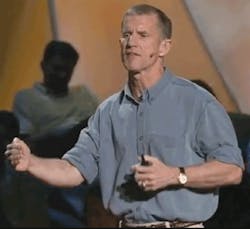”One excellent way to continue learning—especially if you have an Apple iPad and long plane flights—is watching videos from TED Talks: Ideas Worth Spreading (www.ted.com/talks). These began as an exclusive Silicon Valley lecture series with a twist. Speakers are severely limited in the time allotted for speaking. The idea has spread such that there are now TED Talks at locations worldwide.
Many of the talks concern leadership as discussed by leaders. In a recent talk, retired General Stanley McChrystal, the former commander of U.S. and international forces in Afghanistan and a four-star general credited for creating a revolution in warfare that fuses intelligence and operations, discussed leadership in the modern age.
Reflecting upon his early upbringing in leadership, McChrystal noted, “Real leaders don’t lie cheat or steal, and they stand up for their comrades.” His early experience was with leaders who could talk to you personally, looking you in the eye and slapping you on the back. But after 9/11 when he was sent to lead the troops in Afghanistan, he discovered a new world of leadership. “It was a whole new world. The environment, speed and scrutiny evolved quickly. Everything is in a different context. Moreover, the force I led in Afghanistan was spread over 20 countries. I couldn’t get them all in one room, look them in the eye and build their confidence. You have to use email, chat, video conferencing, everything you can find.”
In an analysis not unlike that facing today’s engineers and managers in manufacturing, management requires a new type of leadership. You have to find new ways of reaching out and building confidence. And the people have changed. McChrystal explains, “The force I led was not just grizzled military, so now instead of giving orders, you have to build a sense of shared purpose. Biggest change was generational, ranger platoon. Asked where were you on 9/11, one said, “I was in 6th grade.” We’re operating a force that must have shared confidences, yet we have people with such different expectations.”
If you’re an older leader, you’ll find that the people you lead are much more technically savvy. “There is also inversion of expertise. The changes in technology are such that the lower echelons had better technical skills. So you have to be more transparent, more willing to listen, willing to be reverse mentored from lower,” McChrystal said.
After you watch the video, you might also catch the talk on Compassionate Leadership by Chade-Meng Tan, a Google engineer. There are also many other articles on leadership at www.automationworld.com.
Gary Mintchell, [email protected], is Editor in Chief at Automation World.
TED Talks: Ideas Worth Spreading (www.ted.com/talks)About the Author
Gary Mintchell
Editor in Chief

Leaders relevant to this article:
